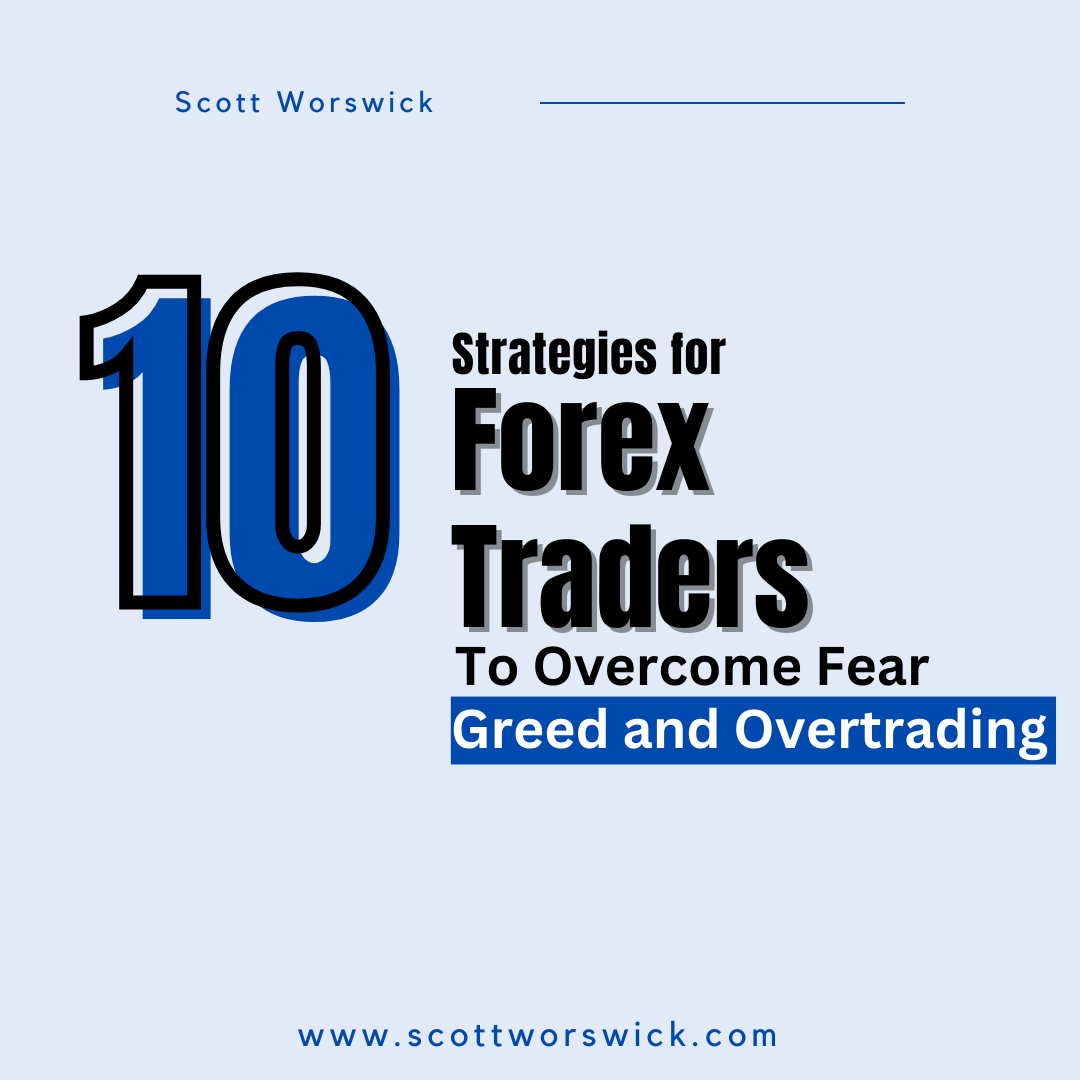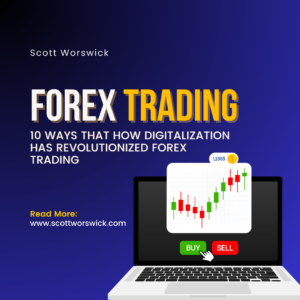Navigating the forex markets can be a rollercoaster ride for even the most seasoned traders. In the fast-paced world of forex trading, emotions often run high, leading to detrimental behaviors such as fear, greed, and overtrading. These psychological challenges can sabotage trading strategies and impede success. However, recognizing and managing these emotions is essential for forex traders to thrive in the dynamic and volatile marketplace.
Fear is a formidable adversary for many forex traders, often leading to hesitation and indecision. The fear of losing money can paralyze even the most confident traders, causing them to miss out on profitable opportunities or exit trades prematurely. Additionally, fear can manifest as a reluctance to take risks, hindering traders from capitalizing on potentially lucrative market movements. Overcoming fear requires developing a rational and disciplined approach to trading, as well as implementing strategies to mitigate risk and manage losses effectively.
Greed is another common pitfall that ensnares many forex traders, tempting them to chase profits at the expense of sound judgment. The allure of quick and substantial gains can cloud traders’ judgment, leading them to deviate from their trading plans and take on excessive risk. Moreover, greed can fuel impulsive decision-making, causing traders to disregard warning signs and neglect proper risk management practices. To overcome greed, forex traders must cultivate patience and discipline, setting realistic profit targets and adhering to predefined trading rules and strategies.
Table of Contents
1. Develop a Solid Trading Plan

Developing a solid trading plan is paramount for forex traders aiming to overcome fear, greed, and overtrading. A well-thought-out trading plan serves as a roadmap, guiding traders through the ups and downs of the market with clarity and discipline. To begin, a forex trader must define their trading goals, risk tolerance, and preferred trading style. By setting clear objectives and understanding personal risk limits, traders can avoid impulsive decision-making driven by fear or greed.
Once the foundational elements are established, forex traders should outline specific entry and exit criteria based on their trading strategy and market analysis. This includes identifying key technical indicators, chart patterns, or fundamental factors that signal optimal trade entry and exit points. By adhering to predetermined criteria, traders can minimize emotional biases and resist the urge to deviate from their plan in response to fear or greed-induced impulses.
Furthermore, a solid trading plan should incorporate risk management strategies to protect capital and mitigate losses. This involves determining appropriate position sizes, setting stop-loss orders, and establishing risk-reward ratios for each trade. By implementing risk management protocols, forex traders can safeguard against the adverse effects of overtrading and emotional decision-making. Consistently following a well-defined trading plan fosters discipline and helps traders stay focused on their long-term objectives, ultimately mitigating the detrimental impact of fear, greed, and overtrading in the forex market.
2. Set Realistic Goals
Setting realistic goals is an essential strategy for forex traders seeking to overcome fear, greed, and overtrading. Establishing achievable objectives provides traders with a clear sense of direction and helps them maintain focus amid the unpredictable nature of the forex market. When setting goals, it’s crucial for forex traders to be both ambitious and realistic. Unrealistic expectations can fuel feelings of disappointment and frustration, leading to impulsive decision-making driven by fear or greed. By setting attainable goals based on their trading experience, capital, and risk tolerance, traders can avoid falling prey to emotional pitfalls.
Moreover, setting realistic goals enables forex traders to manage their expectations and maintain a balanced perspective on their trading journey. Instead of fixating solely on monetary targets, traders should also consider non-financial goals such as skill development, consistency, and risk management. By diversifying their focus beyond profit and loss figures, traders can cultivate a healthier mindset and reduce the likelihood of succumbing to fear or greed-induced behaviors. Emphasizing the importance of continuous improvement and learning fosters resilience and enhances a forex trader’s ability to navigate challenges with confidence.
Additionally, breaking down larger goals into smaller, actionable steps can help forex traders track their progress and stay motivated along the way. By setting short-term milestones that align with their long-term objectives, traders can maintain momentum and celebrate incremental achievements. This approach not only boosts morale but also reinforces discipline and perseverance in the face of adversity. Ultimately, by setting realistic goals and adopting a systematic approach to achieving them, forex traders can mitigate the detrimental impact of fear, greed, and overtrading, paving the way for sustained success in the forex market.
3. Practice Patience for Forex Traders
Patience is a virtue that holds immense significance for forex traders aiming to conquer fear, greed, and overtrading. In the fast-paced environment of forex markets, impatience can lead to hasty decision-making and emotional reactions to market fluctuations. However, cultivating patience allows traders to maintain a calm and composed demeanor, even in the face of uncertainty. By embracing patience, forex traders can resist the temptation to chase quick profits or overtrade, thereby avoiding potential pitfalls that could jeopardize their trading performance.
Furthermore, practicing patience enables forex traders to adopt a long-term perspective and focus on the bigger picture rather than getting caught up in short-term market movements. Instead of fixating on instant gratification, traders who exercise patience understand that success in forex trading requires time, dedication, and persistence. They are willing to wait for high-probability trading opportunities to materialize and exercise restraint during periods of market volatility. By exercising patience, forex traders can make more informed and rational decisions, ultimately enhancing their chances of achieving consistent profitability in the long run.
Moreover, patience is instrumental in helping forex traders navigate through periods of drawdowns or losses without succumbing to fear or panic. During challenging times, maintaining patience allows traders to stay focused on their trading plans and resist the urge to abandon their strategies out of frustration or desperation. Instead of letting emotions dictate their actions, patient traders remain disciplined and stick to their predetermined risk management protocols. This resilience enables forex traders to weather the inevitable ups and downs of the market with grace and composure, positioning them for success over the long term.
4. Implement Risk Management Strategies
Implementing risk management strategies is imperative for forex traders to navigate the volatile markets while overcoming emotions like fear, greed, and the temptation of overtrading. One fundamental approach is diversification, where traders spread their investments across different currency pairs or other assets. By diversifying, forex traders can mitigate the impact of adverse movements in any single position, reducing overall portfolio risk. Moreover, diversification helps traders avoid overconcentration in a single trade, which could otherwise amplify losses and heighten emotional responses, such as fear and greed.
Another vital risk management strategy for forex traders is setting stop-loss orders. These orders automatically trigger a sell-off when a currency pair reaches a predetermined price, limiting potential losses. Incorporating stop-loss orders into trading plans empowers forex traders to establish clear exit points, helping to alleviate the fear of significant downturns in the market. Additionally, stop-loss orders act as a buffer against impulsive decision-making driven by emotions like greed, as they enforce discipline and prevent traders from holding onto losing positions for too long.
Position sizing is a crucial aspect of risk management that forex traders must master. By carefully determining the size of each trade relative to the overall capital, traders can control risk exposure effectively. Adopting a consistent position sizing strategy helps mitigate the urge to overtrade, as traders focus on quality setups rather than sheer volume. This approach fosters discipline and rational decision-making, countering the influence of greed and impulsive trading behavior. Furthermore, proper position sizing ensures that individual losses do not disproportionately impact the overall trading account, fostering resilience in the face of market fluctuations.
Employing a comprehensive risk management plan is paramount for forex traders aiming to thrive in the dynamic financial markets. This plan should encompass various strategies, including but not limited to diversification, stop-loss orders, and prudent position sizing. Additionally, regular review and adjustment of risk management tactics are essential to adapt to evolving market conditions and personal trading objectives. By prioritizing risk management, forex traders can mitigate the detrimental effects of fear, greed, and overtrading, fostering long-term success and sustainability in their trading endeavors.
5. Maintain Trading Discipline

Maintaining trading discipline is paramount for forex traders seeking to navigate the turbulent waters of the financial markets while overcoming the pervasive influence of fear, greed, and the temptation of overtrading. One key aspect of trading discipline is adhering to a well-defined trading plan. This plan should outline specific entry and exit points, risk management strategies, and overall trading objectives. By sticking to their predetermined plan, forex traders can resist impulsive decisions driven by emotions and maintain a clear focus on executing their strategy with consistency and precision.
Another crucial element of maintaining trading discipline is cultivating patience. In the fast-paced world of forex trading, it’s easy for traders to succumb to the allure of quick profits and rush into trades without proper analysis or justification. However, exercising patience allows traders to wait for high-probability setups that align with their trading plan and risk management parameters. By resisting the urge to chase after every market fluctuation, forex traders can avoid unnecessary losses and stay disciplined in their approach to trading.
Furthermore, fostering self-awareness is essential for forex traders to uphold trading discipline. This involves recognizing and acknowledging one’s strengths, weaknesses, and behavioral tendencies. By understanding their emotional triggers and cognitive biases, traders can preemptively counteract the negative impact of fear, greed, and overtrading. Engaging in regular self-reflection and journaling can aid in this process, allowing traders to identify patterns in their decision-making and make adjustments to improve their overall discipline and performance in the forex markets.
6. Practice Mindfulness
Practicing mindfulness is a powerful strategy for forex traders to cultivate a heightened sense of self-awareness and emotional regulation, ultimately aiding in overcoming fear, greed, and the tendency to overtrade. Mindfulness involves being fully present in the moment and observing thoughts, emotions, and sensations without judgment. For forex traders, this means staying attuned to their mental and emotional state while actively engaging in the trading process. By practicing mindfulness, traders can recognize the onset of fear or greed-driven impulses and respond with greater clarity and composure.
One effective mindfulness technique for forex traders is focused breathing exercises. Taking deliberate, deep breaths and directing attention to the sensations of each inhale and exhale can help anchor traders in the present moment and alleviate the grip of emotional reactions. By incorporating breathing exercises into their trading routine, traders can create a mental space to assess market conditions objectively and make informed decisions free from the influence of fear or greed. This practice fosters a sense of calm and centeredness, enabling traders to navigate volatile market environments with greater resilience and clarity of mind.
Moreover, integrating mindfulness into daily trading activities can enhance overall trading performance and psychological well-being for forex traders. Mindfulness practices such as meditation or visualization can help traders develop mental resilience and emotional intelligence, which are essential qualities for success in the financial markets. By regularly dedicating time to mindfulness exercises, traders can strengthen their ability to stay focused, disciplined, and present amidst the inherent uncertainties and pressures of forex trading. Ultimately, cultivating mindfulness empowers traders to respond to market fluctuations with greater equanimity and confidence, leading to more consistent and sustainable trading outcomes.
7. Keep Emotions in Check
Keeping emotions in check is a fundamental aspect of successful forex trading, essential for overcoming the common pitfalls of fear, greed, and overtrading. Emotions can cloud judgment and lead to impulsive decision-making, which can have detrimental effects on trading performance. One effective strategy for forex traders to manage emotions is to develop a heightened sense of self-awareness. By recognizing when emotions such as fear or greed are influencing their actions, traders can take steps to regain control and make rational, objective decisions based on market analysis and their trading plans.
Implementing specific techniques to regulate emotions is crucial for forex traders striving for consistency and profitability. For instance, practicing mindfulness can help traders cultivate a calm and focused mindset, enabling them to respond to market fluctuations with greater clarity and composure. Additionally, setting realistic expectations and accepting that losses are an inevitable part of trading can mitigate the emotional impact of setbacks. By reframing losses as learning opportunities rather than personal failures, traders can maintain a healthier perspective and avoid succumbing to despair or revenge trading.
Furthermore, establishing clear rules and boundaries can help forex traders keep emotions in check and prevent impulsive behavior. This includes implementing strict risk management strategies, such as setting stop-loss orders and adhering to predetermined position sizes. By following a structured approach to trading and sticking to their established rules, traders can minimize the emotional rollercoaster often associated with forex trading. Additionally, seeking support from peers or mentors and maintaining a balanced lifestyle outside of trading can contribute to emotional resilience and overall well-being for forex traders.
8. Focus on the Process, Not the Outcome
Focusing on the process, rather than fixating on the outcome, is a cornerstone principle for forex traders striving to overcome the psychological hurdles of fear, greed, and overtrading. Instead of solely concentrating on the end result of a trade, traders should direct their attention to the steps involved in executing their trading plan effectively. By emphasizing the process, traders can maintain a disciplined approach to their craft, making decisions based on sound analysis and adherence to pre-established strategies rather than being swayed by emotional impulses.
One effective way for forex traders to prioritize the process is to establish clear and actionable trading objectives. Setting specific and measurable goals related to trading performance, risk management, and personal development allows traders to focus their efforts on areas within their control. By concentrating on achieving these objectives, traders can stay grounded in the present moment and avoid becoming distracted by fleeting market fluctuations or the allure of quick profits. This shift in mindset encourages a more disciplined and deliberate approach to trading, fostering consistency and resilience in the face of adversity.
Moreover, fostering a mindset of continuous improvement can help forex traders maintain focus on the process of refining their skills and strategies over time. Rather than becoming fixated on individual trade outcomes, traders should view each trade as an opportunity to learn and grow. Embracing a growth-oriented mindset encourages traders to analyze both successful and unsuccessful trades with curiosity and objectivity, extracting valuable insights that can inform future decision-making. By prioritizing the journey of self-improvement and skill development, forex traders can cultivate a more sustainable and fulfilling approach to trading, free from the constraints of fear, greed, and overtrading.
9. Learn from Mistakes
Learning from mistakes is an indispensable aspect of growth and development for forex traders seeking to overcome the challenges posed by fear, greed, and overtrading. Every misstep presents an opportunity for reflection and learning, allowing traders to identify areas for improvement and refine their trading approach. Instead of viewing mistakes as failures, forex traders should embrace them as valuable learning experiences that contribute to their evolution as traders. By adopting a growth mindset and acknowledging that setbacks are an inherent part of the learning process, traders can extract valuable lessons from their mistakes and apply them to future trading endeavors.
One effective strategy for forex traders to learn from mistakes is to maintain a detailed trading journal. Recording the rationale behind each trade, along with the outcome and any associated emotions, provides valuable insights into trading patterns and decision-making processes. By regularly reviewing their trading journal, traders can identify recurring mistakes or behavioral patterns that may be undermining their performance. This self-awareness enables traders to make proactive adjustments to their trading strategy and risk management practices, reducing the likelihood of repeating past errors.
Furthermore, seeking feedback from peers or mentors can facilitate the learning process for forex traders looking to glean insights from their mistakes. Engaging in constructive dialogue with experienced traders allows for the exchange of ideas, perspectives, and strategies, fostering a collaborative learning environment. By leveraging the collective wisdom of the trading community, forex traders can gain valuable insights into alternative approaches and best practices for navigating the markets successfully. Embracing feedback with humility and a willingness to learn enables traders to accelerate their growth and development, ultimately enhancing their ability to overcome fear, greed, and overtrading.
10. Seek Support and Education
Seeking support and education is paramount for forex traders aiming to overcome the psychological obstacles of fear, greed, and overtrading. Engaging with a supportive community of fellow traders provides invaluable opportunities for learning, sharing experiences, and gaining perspective. Whether through online forums, social media groups, or local trading meetups, interacting with peers allows forex traders to exchange ideas, seek advice, and receive encouragement during both triumphs and setbacks. This sense of camaraderie fosters a supportive environment where traders can draw strength and motivation from one another, enhancing their resilience and perseverance in the face of adversity.
Moreover, investing in education is essential for forex traders looking to develop the knowledge and skills necessary for success in the financial markets. Participating in structured training programs, workshops, or courses led by experienced traders or reputable institutions can provide invaluable insights into market analysis, technical indicators, and trading strategies. By expanding their understanding of market dynamics and refining their trading techniques, forex traders can make more informed decisions and navigate the complexities of trading with greater confidence and competence. Additionally, ongoing education helps traders stay abreast of evolving market trends and developments, empowering them to adapt their approach and seize opportunities for profit.
Furthermore, leveraging mentorship can accelerate the learning curve for forex traders seeking personalized guidance and feedback. Establishing a mentor-mentee relationship with an experienced trader offers a unique opportunity for novice traders to benefit from the insights, wisdom, and real-world experience of a seasoned professional. Mentors can provide invaluable advice, share practical tips, and offer constructive criticism to help forex traders refine their trading approach and overcome common pitfalls. Additionally, mentorship fosters accountability and accountability, encouraging traders to stay disciplined, focused, and committed to their long-term goals. By seeking support and education through mentorship, forex traders can expedite their growth and development, ultimately enhancing their ability to navigate the challenges of fear, greed, and overtrading.
Conclusion
In conclusion, mastering the art of forex trading requires more than just technical expertise; it demands a deep understanding of one’s own psychology and the ability to navigate the emotional highs and lows that come with market volatility. By implementing the strategies outlined in this article, forex traders can effectively overcome the psychological barriers of fear, greed, and overtrading that often impede their success. Through practices such as mindfulness, maintaining trading discipline, and learning from mistakes, traders can cultivate a mindset conducive to making rational, well-informed decisions in the face of uncertainty.
Furthermore, prioritizing risk management and focusing on the process rather than fixating on outcomes can help forex traders stay grounded and resilient amidst the ebb and flow of market dynamics. By setting clear trading objectives, adhering to strict risk management protocols, and embracing a growth-oriented mindset, traders can foster consistency and discipline in their trading approach. Additionally, seeking support and education from peers, mentors, and structured learning programs can provide valuable insights, guidance, and encouragement to forex traders on their journey toward success.
Ultimately, overcoming fear, greed, and overtrading is an ongoing journey for forex traders, requiring dedication, self-awareness, and a commitment to continuous improvement. By adopting a holistic approach that addresses both the technical and psychological aspects of trading, traders can enhance their performance, mitigate risk, and achieve long-term success in the dynamic world of forex markets. With perseverance and a willingness to embrace change, forex traders can navigate the complexities of the market with confidence, resilience, and a steadfast focus on their goals.





Pingback: The Rise of High Ticket Product Business Models: Explore how high ticket product businesses have gained traction in recent years and why they are attractive for entrepreneurs -
Pingback: Fundamental Analysis in Forex Trading: An explanation of how economic indicators, geopolitical events, and central bank policies impact currency prices -